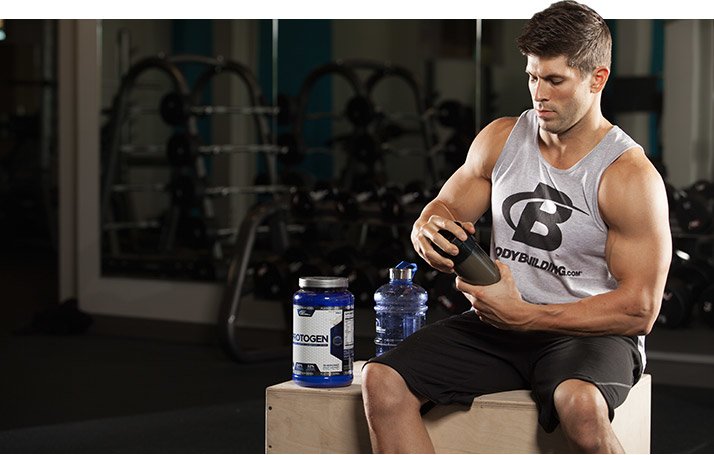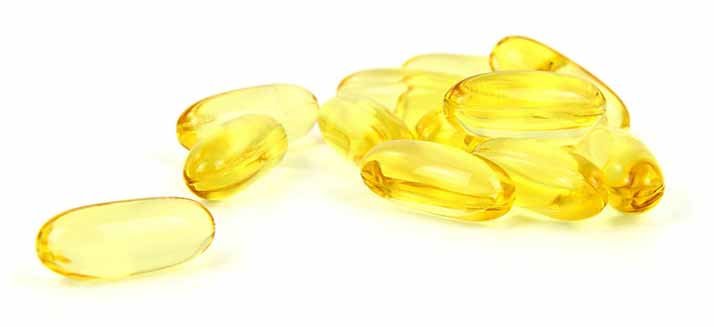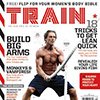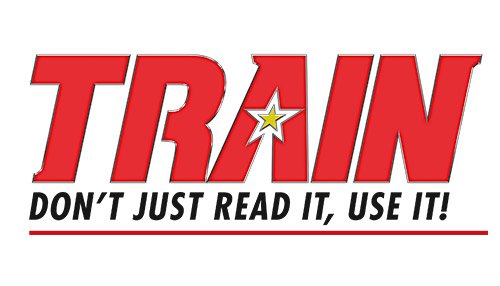
3 Types Of Muscle-Building Supplements For Overall Growth
In its inaugural edition, TRAIN magazine, the newest health and fitness bible, reveals the truth about how they work and what you should be taking when.
Lift big weights. Eat protein. Get muscles. Simple, eh? Unfortunately, no. It's all too easy to hit a muscle-building plateau, and supplements can seem like the answer. But, before you blow your hard-earned cash on whatever supps your local gym has in stock, you should learn how your muscles work.
Your body has two forms of muscle fibers: type-I fibers (aka slow-twitch) help you perform endurance exercise, and type-II fibers (aka fast-twitch) are the large fibers responsible for strength and size when weight training. To damage these type-II fibers enough to cause growth, you have to lift weights and keep your muscles under enough tension to recruit satellite cells.
These cells sit on the top of muscles and help grow, maintain and repair your muscles. They often lie dormant until you do heavy lifting. The heavy lifting causes tiny micro-tears in the muscle fibers, which triggers your satellite cells to multiply and move toward the areas you damage. They use the proteins from food to thicken and strengthen your muscles and you end up with tighter sleeves.
Fortunately, scientists have developed supplements that can help these efforts by influencing your nutritional, hormonal, and energy systems. Learn how to use them to your advantage.
Hormonal supplements

Hormones are the 2 a.m. phone call, the hand-delivered letter, or the email marked urgent. They carry messages that demand your body take instant action. And supplements can gear these hormones toward gaining more muscle.
The two main hormones are testosterone and growth hormone. Yes, messing about with synthetic versions of these hormones is what got Ben Johnson and Arnie into hot water, but you can increase your levels to their highest natural concentrations without running the risk of handcuffs or a hospital visit.
Testosterone Boosters
Testosterone occurs naturally in your body and bumps up your muscle mass by improving muscle-protein synthesis.
Fortunately if you're between the ages of 18 and 35, testosterone boosters probably won't create too much difference because your body already produces enough of its own.
Even if you're older, these supplements won't put your testosterone levels through the roof, but they will put your body in a position to increase your testosterone to its highest natural levels.
Living in a polluted area, using soaps with triclocarban, having a high-sugar diet, and enduring stress can dampen your supplies.
Growth Hormone Supplements
Your body naturally produces growth hormone, and, as the name implies, it's responsible for cell growth and regeneration. It gradually declines with age, transforming your Zac Efron face into a George Clooney.
Without GH, you won't build muscle. Supplementing with it does the same as testosterone boosters, increasing your levels to their highest natural peak.
Age and high training loads can mean you naturally produce less of this hormone, so supplementation can be beneficial before bed.
Energy Supplements
Getting more energy to train will obviously help you work harder in the gym, helping your muscles grow. The trouble is that plenty of energy supplements can leave you more jittery than the junkie Jesse Pinkman from "Breaking Bad."
Energy supps can often also cause weight loss. To make sure your supplement regimen isn't working against your brawn-building goals, you should stick to the supplements listed.
Caffeine
It's pick-me-up in your morning brew blocking the brain chemicals associated with sleep. It also causes your heart to beat faster, opens your airways, and increases muscle blood flow.
Research published in the "Journal of Strength and Conditioning Research" showed that taking caffeine before resistance training improves the total number of reps done and overall strength. It essentially gives you the oomph to train harder.
Trouble is, the more caffeine you have, the more resistant you get to it. It's best to cycle caffeine intake for when you train hard.

Creatine
This bread-and-butter for gym enthusiasts is a combination of three amino acids: glycine, arginine, and methionine. When you drink it, it gives you more adenine tri-phosphate (ATP), which is your body's main energy source. But you only have a finite amount, which is part of the reason your muscles fail on the final rep.
Creatine increases these levels for a few extra reps, helping you get stronger and bigger. It also hydrates your muscles' cells, which improves recovery and ability to build size.
Research published in the "Journal of Strength and Conditioning Research" showed creatine can improve your ability to build muscle by 14 percent.
Recovery using Nutritional Supplements
You cannot supplement yourself out of a bad diet so supplements should be treated as supplements, not substitutes.
Whey Protein
Your muscles break down during exercise and remodel when they repair. Research found that this remodeling process is accelerated by as much as 33 percent when people drink a whey protein shake directly after exercise. That's not enough evidence to suggest protein shakes work better than salmon steaks—it only means that they can work just as well.
Shakes are a valuable asset if you aren't a heartbeat away from your kitchen and are traveling home or going back to work. Your approach should be to drink a protein shake directly after training, then have a high-protein meal at least 60 minutes afterward.

Fish Oil
This supplement has accrued a lot competition since people caught on to its benefits. Despite all the other competing supplements such as krill oil, chia oil, and flaxseeds, fish oil is still the top choice.
The unique fatty acid is rich in omega-3 vitamins, and helps strengthen your cells' membranes, reduce inflammation, and increase blood flow to your brain. These are important recovery aids that will help you repair the damage done to your muscles when training. And the faster you can recover the faster you'll be able to go hard again the next day.
That's What's Sup!
So now you know how all those supplements affect your muscle-building regimen the next step is to work out when you should take them. To save you the trouble, TRAIN has put together a detailed 12-month schedule that'll have you stacking on the brawn quicker than it takes Usain Bolt to get out of the starting blocks. All you have to do is go out and pick up the first edition. We guarantee you won't be disappointed.
| Mo | Test | GH | Caff | Cre | Fish Oil | Pro |
|---|---|---|---|---|---|---|
| Jan | ✔ | ✔ | ✔ | ✔ | ||
| Feb | ✔ | ✔ | ✔ | |||
| Mar | ✔ | ✔ | ✔ | ✔ | ||
| Apr | ✔ | ✔ | ✔ | ✔ | ||
| May |
Supp-Free Month |
|||||
| Jun | ✔ | ✔ | ✔ | ✔ | ||
| Jul | ✔ | ✔ | ✔ | |||
| Aug | ✔ | ✔ | ✔ | ✔ | ||
| Sep | ✔ | ✔ | ✔ | |||
| Oct | ✔ | ✔ | ✔ | ✔ | ||
| Nov | ✔ | ✔ | ✔ | ✔ | ||
| Dec | ✔ | ✔ | ✔ | ✔ | ✔ | |
One Month Pump
A perfect day of muscle-building supplementation leads to a perfect year!

Protein and Carb Shake 1 serving

Creatine 5 g

Caffeine Tablet 100 mg

Testosterone Booster (If you're over 35 years old
Weight training for 45-55 minutes is the ideal time period to train. Research in the "Journal of Strength and Conditioning Research" found that short, yet intense, weight sessions gave lifters some of the biggest surges of testosterone—your chief muscle-building hormone.


